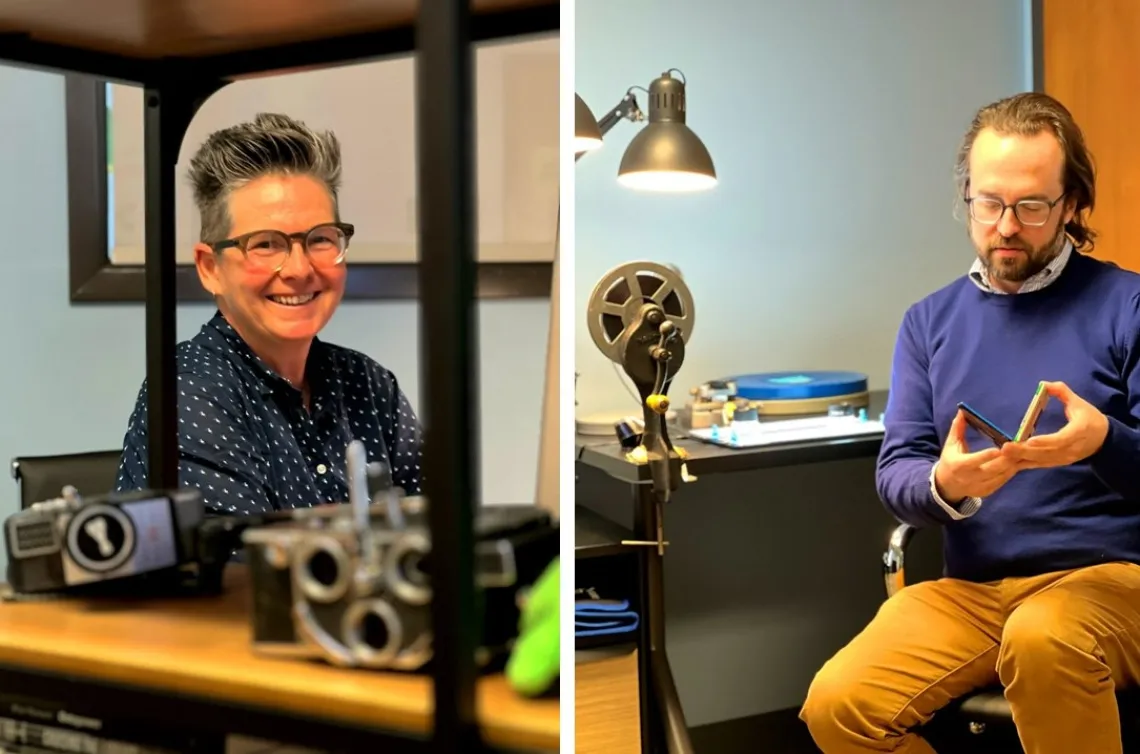Critical Archives & Curation Collaborative (co/lab) – UArizona iSchool's Newest Research Lab

iSchool Professors Jamie Lee and Zack Lischer-Katz in the co/lab
The School of Information, or iSchool, launched a new lab, the co/lab: the Critical Archives & Curation Collaborative. The lab, co-directed by Professors Jamie A. Lee and Zack Lischer-Katz, furthers the iSchool’s mission to explore “the intersections of people, data, and technology, empowering a diverse, equitable, and inclusive future through information.”
The co/lab’s objective is to promote and support cutting-edge information and archival studies research that critically engages with archival contexts – across community and institutional archives, materials, and practices, including the critical curation of collections and artifacts in digital and analog formats.
The co/lab is both a physical space and virtual community that provides social and technical resources for the transdisciplinary study of digital curation, archiving and archival contexts, and emerging preservation practices across the University of Arizona campus, U.S.-Mexico Borderlands, and throughout Southern Arizona.
The co/lab is located within the iSchool and provides resources for digital storytelling, analyses of embodied archival practices and other memory and knowledge production, and engagement with the materiality of archival artifacts through analog and digital media technologies. A focus on power and the technical and epistemic labor of archival work and digital curation ground the research in the lab.
The co/lab promotes critical archival research and curation through a set of initiatives and research projects by:
- Providing research tools for engaging with the body and the materiality of archival formats, including digital storytelling and audiovisual equipment, digital forensic and digital curation software and hardware, and obsolete media devices for media archaeology investigations.
- Exploring emerging archival formats and practices, including digital storytelling, non-institutional archives and community archives, 3D, VR/AR, volumetric video, and other new media formats, through seminars and collaborative grant-funded projects.
- Nurturing a network of local and global researchers to promote and support collaborations between researchers in the sciences, social sciences, arts, and humanities.
- Promoting cross-disciplinary critical inquiry through seminars, and publications on topics related to the curation and preservation of visual and other forms of multi-sensory information.
- Providing pedagogical opportunities for students with research-related hands-on experiences in archival contexts, multimodal media productions, and digital curation and preservation.
Please contact Lee or Lischer-Katz if you would like to visit the co/lab or discuss potential research collaborations: colab@arizona.edu
About Jamie A. Lee’s research
As an interdisciplinary scholar of critical archival studies, gender and sexuality studies, and of multimodal media production / oral history, Lee’s research engages both the deep inquiry across these distinct fields while also documenting the cultural aspects of these overlapping interstitial spaces of power that are often overlooked in structured disciplinary research. They are interested in social change and asking difficult questions. A documentary filmmaker and founder of Arizona’s first LGBTQI archives, the Arizona Queer Archives (www.arizonaqueerarchives.com), their research is inspired by and informs these sites of practice and inquiry. For more information on Lee’s research, visit www.thestorytellinglab.io.
About Zack Lischer-Katz’s research
Lischer-Katz studies the curation and preservation of visual information formats, such as virtual reality, 3D, video, and film. Current projects include researching curation tools and techniques for 3D and volumetric formats and investigating the accessibility challenges of virtual reality technologies for disabled users in academic libraries. At the co/lab, he conducts research on practices of data collection, digital curation, and media preservation techniques across disciplines; critical and material analysis of tools and artifacts used to support data curation, digital forensics, visual analysis, and media preservation in different research and institutional contexts; and research on the material practices of digitization work and the role played by sociotechnical systems and standards in constructing knowledge in preservation work. You can find out more about his research at http://zacklischerkatz.com.

